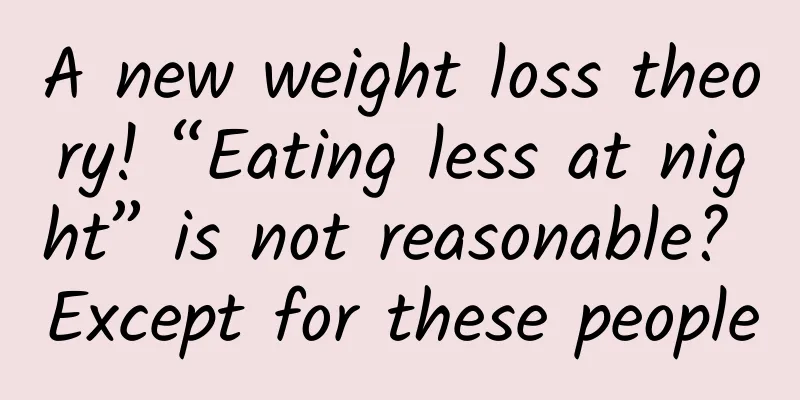A new weight loss theory! “Eating less at night” is not reasonable? Except for these people

|
After the Mid-Autumn Festival, everyone must have gained some weight again , and it’s time to start losing weight again. However, almost everyone knows that losing weight is not easy - not only do you need to strengthen physical exercise, but you also need to control your diet properly. It's like trying to climb two "rows" of mountains. After climbing this mountain, there is another mountain to climb... For me, compared to physical exercise, how to properly control diet has always been a super difficult problem . As an office worker, irregular eating times, overeating under great pressure and other unreasonable behaviors make it very difficult to complete the OKR of losing weight. I don't know when it started, but the weight loss advice of "eat less at night" has been increasingly adopted and practiced by our elders and friends, who strongly recommend it to us: "Eat appropriate breakfast and lunch, and eat less at dinner." The explanation often heard is that consuming most of the daily calories in the morning will be more efficient and can help lose weight better. Some extreme weight loss people even choose to only eat some green leafy vegetables at night, or not eat at all. (But if you eat less at night, you will feel hungry~) (Source: Pixabay) But the question is, is the advice of “eating less at night” scientific and reasonable? Recently, a study published in the Cell journal showed that people who eat more at night do not necessarily gain weight. No matter which meal we eat the most in the morning, noon or evening, it will not affect the way the body metabolizes calories. This conclusion is very different from people's previous cognition. The related research paper, titled "Timing of daily calorie loading affects appetite and hunger responses without changes in energy metabolism in healthy subjects with obesity", has been published in the scientific journal Cell Metabolism. (Source: Cell Metabolism) In addition, the study also showed that although eating more at night has been shown to not affect the way the body metabolizes calories, people who eat more in the morning are more likely to lose weight because they are more resistant to hunger during the day and have relatively weaker hunger feelings. Misunderstandings about “eating well” Obesity refers to a physical condition in which excessive accumulation of body fat has a negative impact on health, which may lead to a shortened lifespan and various health problems. It has become one of the most serious public health issues in the 21st century. Generally speaking, obesity is related to genetic factors and lifestyle. In terms of lifestyle, the main causes of obesity are excessive calorie intake and insufficient physical exercise, that is, calorie consumption is less than calorie intake. In fact, the reason most people lose weight is not because they are fat , but because they want a better-looking body. Therefore, drug treatment is generally not involved, but it is achieved by controlling dietary intake and increasing physical exercise. However, according to Alexandra M. Johnstone, professor at the Rowett Institute at the University of Aberdeen and the corresponding author of the paper, there are many misunderstandings about the time of meals and how eating affects weight or health. "This is largely influenced by the circadian rhythm. We want to know where the energy goes and what the metabolism is like throughout the day." To this end, Johnstone et al. recruited a group of overweight or obese trial participants, controlled their diet and measured their metabolism over a period of time. Among them, 16 men and 14 women completed the experimental tasks. Figure|Normal, overweight and obese body outlines (Source: Wikipedia) During the first week of the trial, participants followed a weight-maintaining diet and consumed 1.5 times their resting metabolic rate to provide the energy they needed for daily bodily functions. Over the next four weeks, each participant either ate more only at breakfast or only at dinner —the diets were isocaloric, consisting of 30% protein, 35% carbohydrates, and 35% fat. At the end of the 4 weeks, after a week of adjustment (following a weight-maintaining diet), each participant switched to the opposite diet for the next 4 weeks. Figure|Experimental design. (Source: This paper) Based on this design, each participant became their own control group for the study. At the same time, throughout the study, Johnstone et al. measured the participants' total daily energy expenditure using the doubly labeled water method and recorded weight changes after 4 weeks. The results showed that energy expenditure and weight loss were similar for "eating more in the morning" and "eating more in the evening", with each participant losing a little over 3 kg on average (3.33 kg and 3.38 kg, respectively) . In addition, Johnstone et al. also made another discovery after comparing different eating patterns: participants who ate more in the morning were more likely to control their appetite, felt less hungry during the day, had lower levels of appetite-stimulating hormones in the body, and higher levels of hormones related to satiety. “One of the main reasons people fail to lose weight is because they’re hungry ,” Johnstone said, “so this could be a really beneficial strategy.” Of course, this study also has certain limitations. For example, the experiment was conducted under free-living conditions rather than strictly controlled under laboratory conditions. In addition, the measurement of certain metabolic indicators could only be performed after breakfast, not after dinner. Johnstone believes that the experimental methods used in this study could also be applied to studies related to intermittent fasting , helping to determine the best time of day for people following this diet to consume calories. So...eat more at night? NO! Since eating more at night does not necessarily lead to weight gain, can I eat as much as I want at night from now on? Obviously not. In addition to the reason given by the above study that "eating more in the morning can make you feel fuller", another recently published study also does not recommend eating more at night because "eating at night will increase people's depression and anxiety-related emotion levels." To put it in an exaggerated way, eating at night can easily lead to depression, so try to eat during the day. (What? Eating skewers in the middle of the night isn’t fun anymore?) The related research paper, titled “Daytime eating prevents mood vulnerability in night work,” has been published in the scientific journal PNAS. (Source: PNAS) According to the paper, the research team tested the effects of eating during the day and at night, versus eating only during the day. Results showed that among participants in the daytime and evening eating groups, levels of depression-like emotions increased by 26 percent and levels of anxiety-like emotions increased by 16 percent , while participants who ate only during the day experienced no such changes. In this regard, Frank AJL Scheer, a professor at Harvard Medical School and co-corresponding author of the paper, believes that the timing of food intake has become a new strategy that may minimize the emotional vulnerability of those who experience circadian rhythm disorders, such as those who work shifts, experience jet lag, or have circadian rhythm disorders . "Meal timing is emerging as an important nutritional factor influencing physical health," said Dr. Wang. "But the causal role of meal timing on mental health remains to be tested. Future studies are needed to determine whether changes in meal timing can help people experiencing depression and anxiety/anxiety-related disorders." Perhaps, eating well during the day is an option that can be prioritized. What do you think of the above research? Reference Links: https://www.cell.com/cell-metabolism/fulltext/S1550-4131(22)00344-8https://www.newscientist.com/article/2337329-altering-when-you-cons ume-your-calories-doesnt-change-weight-loss/https://www.pnas.org/doi/full/10.1073/pnas.2206348119https://en.wikipedia.org/wiki/Obesity |
<<: Breast cancer, hepatitis, ovarian cancer... Is hair dyeing responsible for so many problems?
>>: Science Explains | What is the reason for singing out of tune? Can it be cured?
Recommend
SMIC Financial Report: SMIC's revenue in Q2 2023 was US$1.56 billion, down 18% year-on-year
According to recent news, China's largest waf...
It is difficult to charge new energy vehicles, and charging pile operating companies are powerless. Who will break this vicious cycle?
In recent years, due to the use of ternary batter...
I was bitten by a snake! What should I do? What should I do?
Life is not just about the immediate, but also ab...
Are you a little nervous about the start of school? These psychological adjustment tips will help you avoid the "back-to-school syndrome"!
Recently, as the holiday is running out, the numb...
Wu Dayong丨From mask making to cancer screening, nanofibers are so powerful
A distance as short as one millimeter, In fact, i...
Four reasons you don't need to replace your smartphone every year
Smartphones have made significant progress in the...
Why are buildings made into "potato chips"? Not to tempt you, but because they are strong...
01 Potato Chips. What shape are you? In fact, the...
Himalaya FM audio traffic promotion plan
Himalaya FM is a well-known audio sharing platfor...
9 practical methods behind the hot new media headlines!
It is said that a good title is half the battle o...
Apple held its first conference this year, and Cook revealed some information
On March 1, Apple held its first conference in 20...
I swear! I swear! I swear!
He is taciturn After saving people from the mud F...
3 tips to teach you how to write pain point copy!
Do you remember the heartwarming video of 999 Col...
They hammered away, hammer after hammer, and made a surprising discovery
The ecological restoration diagram of the spiral ...
Short video operation: How to achieve 1.6 million+ fans?
In short video operations , if you want to do a g...









